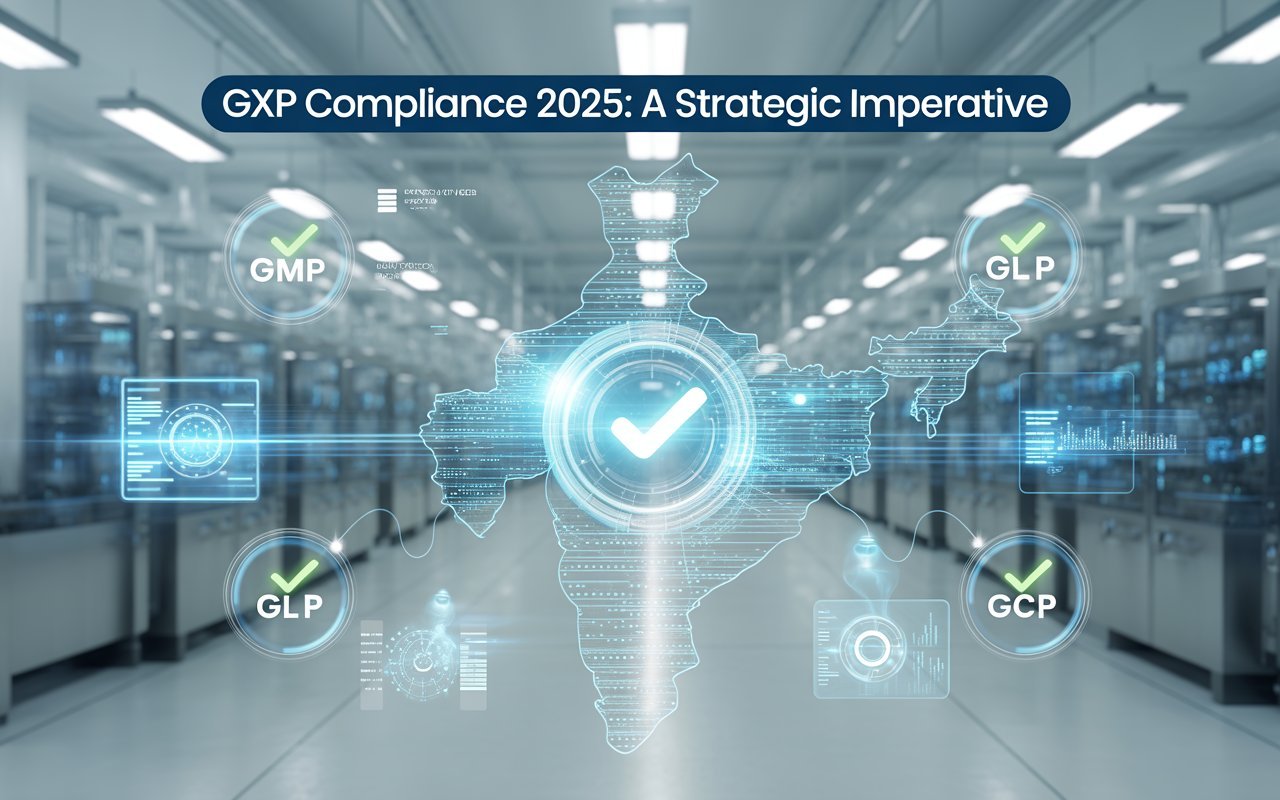The Stark Reality of Non-Compliance
$5.05M: Average cost of data breaches when non-compliance is a factor — 12.6% higher than the baseline.
77% of organizations cite compliance complexity as a barrier to growth.
48% of Indian pharma SMEs faced GMP violations in 2023. *(CDSCO Report)
🌐 Introduction: The High-Stakes Compliance Landscape
In 2025, GxP compliance is more than regulatory necessity—it’s a strategic imperative. With global regulatory bodies levying record-breaking fines (e.g., Apple’s €13B tax penalty) and public health scandals mounting, pharma companies face escalating risk.
85% of pharma executives report increased complexity in compliance expectations. Non-compliance increases breach costs by an average of $220K.
For Indian pharmaceutical firms targeting global markets, GMP, GLP, and GCP adherence isn’t optional—it’s existential.
📊 GxP Regulations in India: CDSCO & Beyond
India’s compliance ecosystem aligns global best practices with country-specific mandates:
| Standard | Governing Body | Key Indian Reference |
| GMP | WHO, ICH | Schedule M (Drugs & Cosmetics Act) |
| GLP | OECD | CDSCO Guidance 2025 |
| GCP | ICH-GCP | ICMR Ethical Guidelines 2025 |
Critical 2025 Updates:
- Mandatory AI Audits: CDSCO mandates AI-validated data integrity for high-risk processes.
- State-Specific Rules: Maharashtra now requires real-time environmental monitoring in API facilities.
- Stricter Penalties: Repeat violations may lead to ₹10 crore in fines + 5-year license suspension.
Why Is GXP Compliance Important?
Maintaining GXP compliance isn’t just a regulatory checkbox, it offers visible benefits:
✅ Protects Patient Safety
Improper practices can lead to contaminated or ineffective drugs. GXP standards safeguard end users.
✅ Ensures Regulatory Approval
No GXP? No approval. Regulatory bodies like the FDA, EMA, and CDSCO require strict compliance.
✅ Builds Brand Trust
Companies that consistently meet GXP guidelines earn the trust of doctors, patients, and regulators.
✅ Minimizes Legal Risk
Failure to comply may lead to imposition of fines, recall of products, and negative reputation.
Core Principles of GXP Guidelines
All of the GXP systems, no matter whether it is GMP, GLP, GCP, etc. have the following fundamental principles in common:
- Traceability: Every process and decision must be documented and auditable
- Accountability: Clearly defined roles, responsibilities, and training
- Data Integrity: The records have to be accurate, complete and they cannot be modified
- Validation: Systems and equipment as well as processes have to be tested and validated
- Quality Control: Regular audits and inspections to catch issues early
⚖️ GMP vs. GLP vs. GCP: The Compliance Trinity
| Aspect | GMP | GLP | GCP |
| Core Focus | Manufacturing quality | Lab data reliability | Clinical trial ethics |
| Top Risk | Cross-contamination | Data manipulation | Invalid informed consent |
| Tech Mandate | IoT-enabled HVAC tracking | AI-driven audit trails | eConsent platforms |
Case Study: A Hyderabad-based pharma exporter lost WHO certification due to GLP failures in instrument calibration, resulting in a ₹200 crore loss in contracts.
🚀 Why Compliance Drives Business Growth
- Market Access: Top 10% compliant Indian firms saw 35% YoY export growth.
- Faster Innovation: AI-enabled GCP compliance cut clinical trial approvals by 40%.
- Investor Trust: 73% of investors favor ESG-compliant pharma firms.
| Book a Consultation with Us Call Now | Contact us |
🔧 Building a Future-Proof GxP Framework: 5 Key Steps
- AI-Powered Gap Analysis
Use tools like MasterControl to audit against CDSCO’s 300+ clauses. Prioritize data integrity weaknesses.⁸ - Unified Digital Documentation
Transition from paper to 21 CFR Part 11-compliant platforms (e.g., Veeva Vault). 82% of companies are investing in compliance tech.⁹ - Role-Specific Training
Simulate high-risk scenarios (e.g., aseptic filling) with VR-based modules. Quarterly training adopted by 60% of firms.³ - Predictive Risk Monitoring
Deploy IoT sensors with AI alerts to monitor temperature and humidity in real-time.⁴ - Third-Party Audits
38% of companies now outsource compliance audits to ensure objectivity.
📈 The Cost of Inaction vs. Strategic Investment
| Metric | Non-Compliant Firms | Compliant Firms |
| Data Breach Costs | $5.05M | $3.83M |
| Export Growth | -12% YoY | +35% YoY |
| FDA Audit Pass Rate | 48% | 92% |
Who and What is Centecurra Healthcare?
At Centecura Healthcare, we empower pharmaceutical and medical device companies to navigate GxP compliance, formulation development, and scientific communication with confidence. Supported by a group of experienced industry experts, we will collaborate with the clients to achieve the level of quality, safety, and regulatory excellence worldwide.
Our expertise spans GMP and related GxP areas, offering tailored solutions for formulation development, scale-up, and technology transfer — from early-stage development to commercial manufacturing. We also assist in streamlining, minimize risk, and can speed up time-to-market.
Our scientific writing team transforms complex data into impactful documents — including regulatory submissions, research publications, technical reports, and educational content — ensuring clarity, credibility, and the right audience reach.
Our mission at Centecura is clear, we want to contribute to the well-being of the patients by the healthcare organizations with the help of compliance, innovation, and friendly communication.
FAQs: GxP Compliance in 2025
Q: How does India’s Schedule M differ from EU GMP?
A: Schedule M permits 3-month stability data for domestic drugs, while EU GMP mandates real-time impurity tracking for global batches.
Q: Can AI replace human GxP auditors?
A: No. AI identifies anomalies, but human auditors contextualize findings. 71% of firms use AI for predictive audits.
Q: What’s the penalty for falsifying clinical trial data?
A: Offenders face criminal charges under Sec. 274 + permanent trial site blacklisting.
Q: Do Ayurvedic products require GLP compliance?
A: Only for lab testing. Schedule T mandates GMP but excludes GCP/GLP.
Q: How long must GxP records be retained?
A: At least 7 years post product expiry (GMP) or study closure (GLP/GCP).

